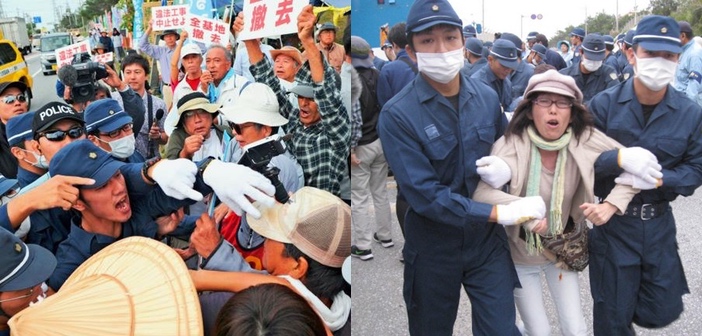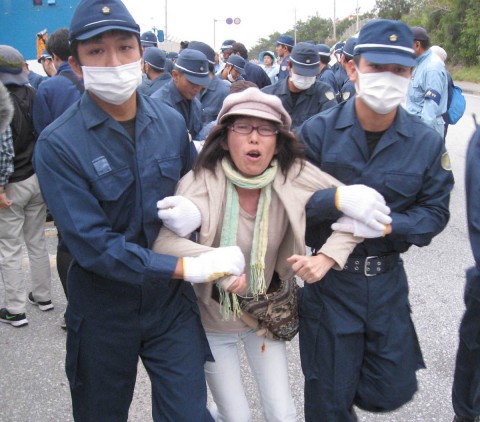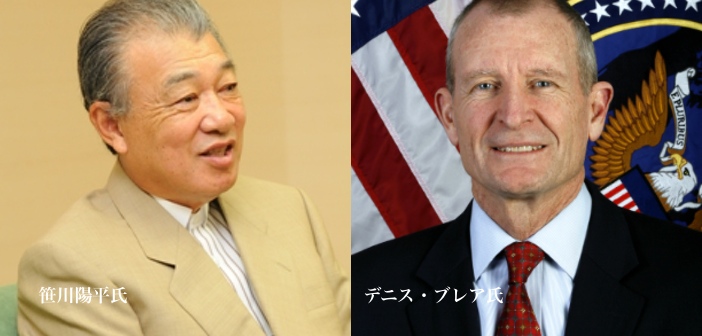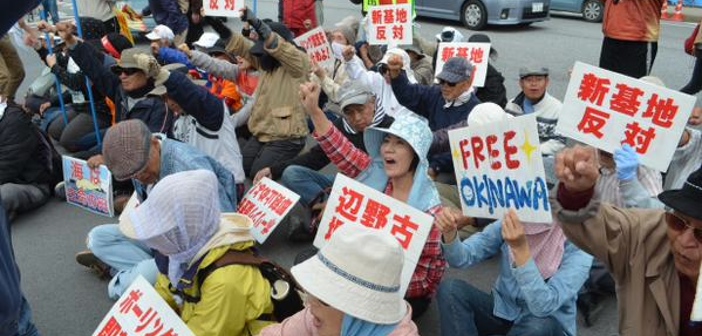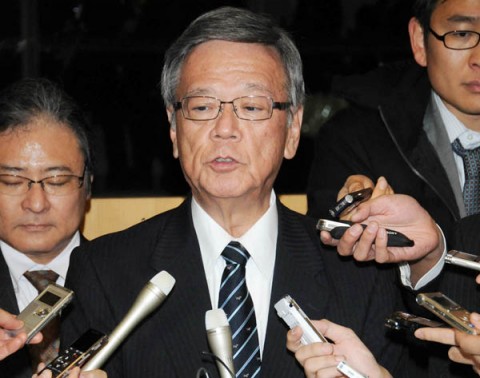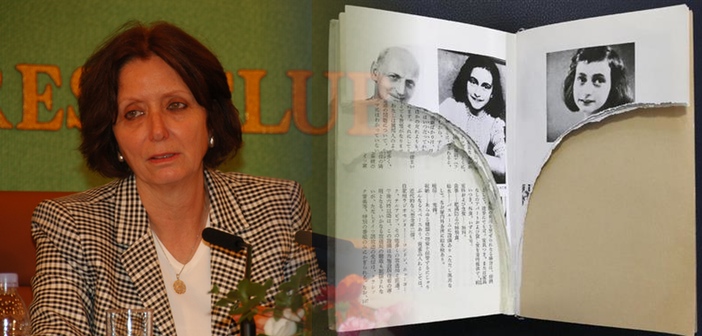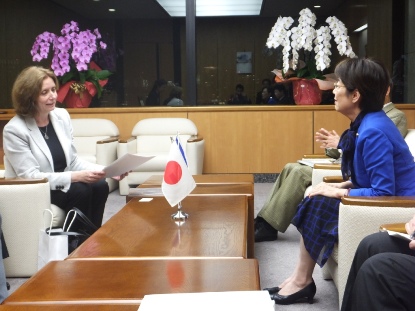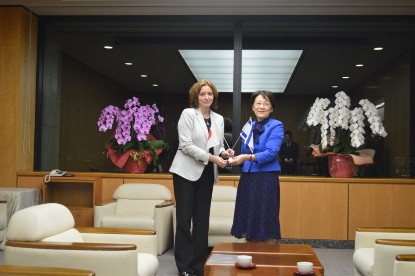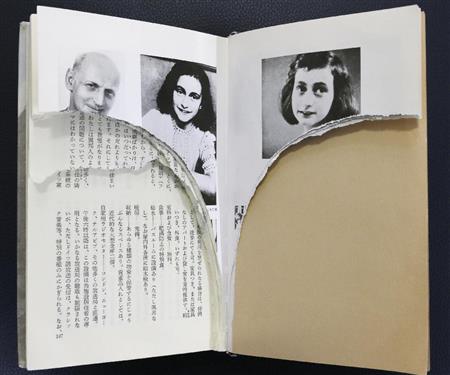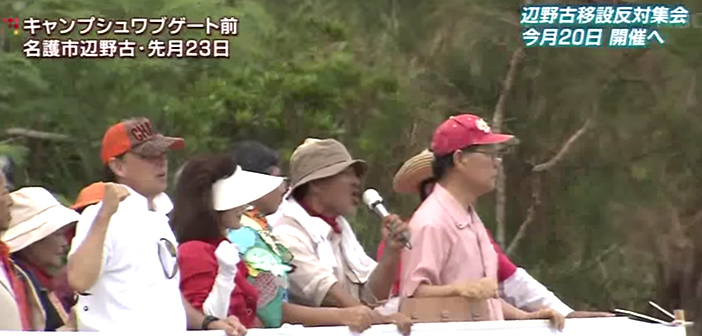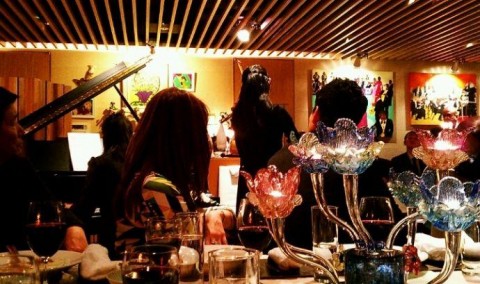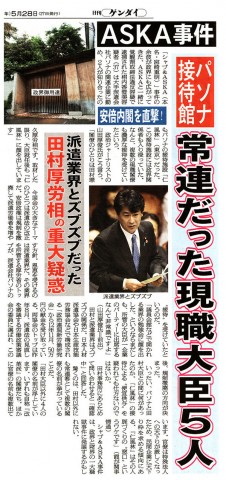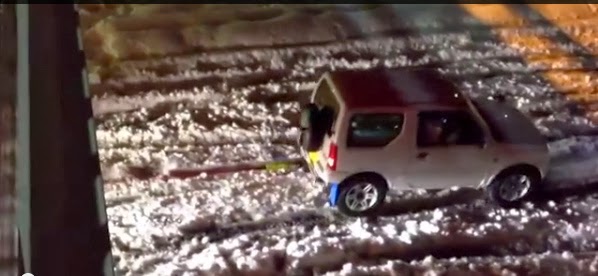A writer living in Okinawa, Mr. Shu Medoruma says “Anger of Okinawa will spread over Japan”
I visited Okinawa with my family from 25 to
27. We were able to go to the sea and Camp Schwab gate in Henoko. I had a talk
from a lady who continued a sit-in on the scene. If you oppose against
relocation of the U.S. base to Henoko, I do recommend you to visit the site in Henoko.
You can’t tell what is going on unless on the site.
As mentioned in the article, I also felt a “gap
between Japan and Okinawa.” If this goes one, the people of Okinawa will give
up on people in the mainland and aim at independence. I think that realistically,
it is impossible to relocate the base to Henoko. The more attention is drawn to
the place, the more light of awareness is showered there. Under such
circumstances, wrongdoing will be exposed and any plan will never go smoothly.
Furthermore, not human law but divine law will be applied, and as a result, for
example, crackdown on the citizens, as shown in the article, will be judged by
deities. As long as I make a comment, it is sure to happen. In other words, if
anybody who engages in apparently illegal activity, though ordered by the
government, is to be judged. Every human being is supposed to have the decency
to know what the right thing to do is.
If what is happening in Okinawa is revealed,
who will be in trouble? Protesters in Okinawa should want people in the
mainland to know more about the reality, too. The major mass media have avoided
reporting this issue to the public. It apparently shows that exposure of the
truth will suffer the government most. This is the proof of the government who
has done wrong. All that are engaged in illegal acts to the eye of God will be
judged.
Specifically, every time such people commit
illegal acts, they feel sicker. It is a sure sign of judgment. If continuing
illegal acts, they won’t be able to work any longer. They should stop no more
stupidity.
Masatoshi
Takeshita
March
30, 2015
English translation of a Japanese article: Nikkan Gendai – March 30, 2015 –
A writer living in Okinawa, Mr. Shu
Medoruma says “Anger of Okinawa will spread over Japan”
Governor Oganga issued instructions to stop
relocation work, but …
Tactics
for removing protesters by Coast Guard Marine Like “Public Security at Sea”
The Conflict between
Okinawa Prefectural government and the Abe administration is just like in the
state of warfare. Chief Cabinet Secretary Suga ignored
the will of Okinawans who protest against relocation of the U.S. base to
Henoko, remove protesters, applied for a stay of execution of the instruction
to stop work related to relocation of the base to Henoko by Governor Takeshi
Onaga, and raised his voice, saying “(The instruction by Governor Onaga is) Illegal”
or “Invalid.” Isn’t his attitude the denial of democracy by power and disdain
for Okinawa? We have asked for the opinion of Mr. Shun Medoruma, 54, an
Akutagawa prize winner who has kept on protest activities in Okinawa.
-
Although people in Okinawa clearly oppose to the relocation of the
base to Henoko, the administration ignores it as if they said “the one
to blame is Okinawa.”
“The Okinawa Defense Bureau has resumed the
seabed boring for the first time in half a year since last September. During
the period, there were the Okinawa gubernatorial election and the Lower House
election. In both elections, candidates who pledged to oppose to the relocation
of a new base in Henoko won overwhelming victories. Resumption
of the survey by the Japanese government/Ministry of Defense tramples on the
public opinion of Okinawa people. They should
stop conducting the survey and review the plan itself. It is not allowed
to forcefully conduct the survey by brutal force of the police and the Japan
Coast Guard.”
-
Mr. Medoruma, you participate
in protest activities, as acting write. What is carried
out on the site of Henoko?
“We have participated in protest activities
both in the front of Camp Schwab gate (on land) and at sea. On land, crackdown by Okinawa prefectural riot police has
been escalated. When a protest started last July, there were tens of
participants and only a few private bodyguards. However, the bigger protest
activities became, the more intensified the guard at the gate and crackdown
system got. Citizens have been forcefully removed by
the riot police so often. Some women or aged people have hurt by being
push down by the riot police or leaders of the protest on the site have been
detained by the security guards at the base. The
central government’s intention to forcefully suppress the people of Okinawa
Prefecture by violent crackdown is clearly seen.”
-
Is it the same at sea?
“Officers of the
Japan Coast Guard have committed harassment in many ways; they overturn canoes
of protesters to capture them or have fallen canoe members drink sea water by
sinking their faces into the sea. They get aboard protest boats and hurt
captains and crew. We see their intention to inflict physical and mental
damage on such crew so that they cannot go to sea. When the media report it,
their violence temporarily stops but soon they repeat violence. Members of the
Japan Coast Guard have not come to Henoko for saving human life. They are the “Public
Security at sea” and respond to canoes and boats carrying protesters with the
same sense of counterterrorism and crackdown against foreign smuggling rings or
smuggling boats. It is quite natural that protesters get hurt.
It is impossible
to suppress our heart by violence.
-
Why is the Abe administration
in a rush to do the project, neglecting the public will?
“I suppose that the government has such
judgment that once an accomplished fact is created and the main work of
relocation the established fact is started, Okinawans will be got into the mood
of giving up, and as a result, protest activities will be slowed down and
reduced.”
-
Did they have
no intention to listen to the opinion of Okinawans from the start?
“Even if they suppress protest activities
by violence, they cannot suppress our heart. Violence brings about anger and
hatred in the heart of people. The Abe administration
just proceeds with the work with violence “in a calm manner” even without
talking with the governor. It’s the worst technique. It only intensifies
Okinawans’ hostility and anger against the government as well as antipathy
toward Yamantu (people in the mainland).”
-
The Abe administration proceeds
even with modification of the Constitution. You claim that “the Constitution
and the Japan-U.S. Security Treaty are one pair.”
“I learned from a book by Prof. Shoichi
Koseki, scholar of constitutional law, that Articles 1-8 of the Japanese
Constitution related to the Emperor, Article 9 and the concentration of U.S.
military bases in Okinawa constitute the trinity. After the war, the U.S.
needed to maintain the Emperor System to smoothly carry out occupational
administration of Japan. However, it was likely to cause uneasiness and backlash
against Japan among invaded Asian countries and the U.S. created a mortgage
with which to have Japan never become invader. The U.S. simultaneously built a
gigantic U.S. base in Okinawa to cope with the U.S.S.R. aiming for expansion of
the communist bloc in Asia. Since the end of war, the government
has tried to distract public attention form the contradiction existing between
the Article 9 of the Constitution and the Japan-U.S. Security Treaty by
concentrating U.S. military bases in Okinawa, while the Japanese people have avoided shoulderig the burden Okinawans had to
bear by providing U.S. bases by pretending not to look at the truth.”
Arrogance
and discrimination against Okinawa of central media
-
Unlike the coverage by Okinawa
local paper, the media stationed in Tokyo report almost
no problems in Okinawa.
“I think that if
the media speak for the government, it is the death of journalism. If they are not interested in Okinawa, they must have dull-sensitivity as journalists or a sense of discrimination against Okinawa that it doesn’t
matter if U.S. bases are imposed to be stationed in Okinawa.
A gap between Japan and Okinawa has been incessantly
expanded for the last decade. I feel that more and more
people in Okinawa tend to think that Okinawans had better abandon Japan
and it is no use expecting Japan to do something for
Okinawa because Japan thinks only about using Okinawa and Japanese are never interested in the base issue however strongly
we call for the country to pay attention to the issue.”
-
How about the future?
“Most of the people who come to Nobeko or
Takae to participate in protest activities have gained information on the
Internet or known the reality by engaging in screening documentary films on a
non-profit basis in various places across the country. Those who actually take
action have the ability to get information by themselves. Even if the entire of
the Japanese are indifferent to Okinawa, it is possible
to remove bases if the people in Okinawa resort to force and take serious action.
If several thousand Okinawans block major gates of the
Kadena air base and they manage to stop the function of the base for a week,
the U.S. government will withdraw the U.S. forces stationed in Okinawa,
whatever the Japanese government does.
* Shu Medoruma He was born
in Nakijin Village, Okinawa Prefecture in 1960. He graduated from Faculty of
Law, Economics and Humanities, University of the Ryukyus. He was awarded the 11th
Ryukyu Shinpo Short Story Prize in 1983 for his short story “Gyogun-ki (Diary of a School of Fish)” and
the 12th Shin-Okinawa Literature Prize in 1986 for “Heiwadori to nazukerareta machi o aruite
(Walk around the town named Peace Boulevard).” He was awarded the 117th
Akutagawa Prize in 1997 for his short story “Suiteki” (Droplets).”



